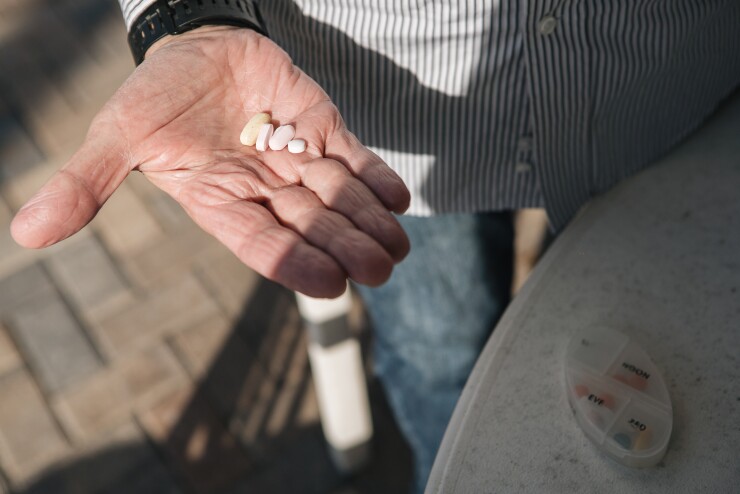Units of CVS Health Corp., Cigna Group and UnitedHealth Group Inc. charged significantly more than the national average acquisition cost for dozens of specialty generic drugs, bringing in more than $7.3 billion in "excess" revenue over six years, the Federal Trade Commission said in a report on the drug middlemen.
The practice inflated costs for consumers and insurers on key treatments for cancer, multiple sclerosis, HIV, organ transplants and other conditions and procedures, the FTC said. The report demonstrates how pharmacy benefit managers influence every aspect of the pharmaceutical supply chain, an FTC official said at a press briefing on the report Tuesday.
The
CVS said it has complied with the FTC's demands by providing more than 2 million documents and 7 terabytes of data. A company spokesman said the lawsuit appeared to be linked to CVS' attempt to have commissioners of the FTC removed from a related case about insulin costs. CVS said it was "misleading" for the agency to draw conclusions based on "outliers" without evaluating broader drug spending patterns.
Cigna's Express Scripts called the report "another set of misleading conclusions based on a subset of medications that represent less than 2% of what our health plans spend on medications in a year" and said the FTC had failed to address the underlying causes of rising drug prices.
UnitedHealth's Optum unit said the company is lowering the cost of specialty medications and helped patients save $1.3 billion in 2024, with a typical out-of-pocket payment of $5.
Two-year probe
The interim report, the product of a more than two-year inquiry by the antitrust and consumer protection agency, is its second looking at pharmacy benefit managers — the middlemen that negotiate drug prices between manufacturers, pharmacies and insurers.
An
PBMs say they lower costs for their clients — employers and health plans — by negotiating with drugmakers that otherwise would have no check on the prices they could charge. The industry criticized the FTC's earlier report, too, saying it cherry-picked examples, and commissioned its own analysis to dispute the agency's claims.
Tuesday's report focuses on specialty drugs, an ill-defined category that describes costly drugs for complex conditions that sometimes require special handling. Specialty pharmacies owned by the three companies account for nearly 70% of all US specialty drug revenue, according to the FTC. Consolidating with health insurers, pharmacies and other medical businesses lets them favor affiliated businesses under their own corporate parents, the agency said.
Dozens of drugs
The FTC analyzed 51 specialty generic drugs and found that the companies often marked up prescriptions for them by more than $1,000 compared with the national average acquisition cost. Those inflated prices help drive income at their parent health care companies, with the drugs accounting for 12% of the aggregated operating income of their PBM and pharmacy businesses in 2021, according to the report. Plan sponsors, such as employers and unions, paid $4.8 billion for specialty generic drugs in 2021, while patients paid $297 million, the FTC found.
The antitrust enforcer also said the conduct featured a form of "steering," under which it included "practices that may nudge patients toward making particular pharmacy dispensing choices, in addition to practices that more directly force patient choices."
The study is being conducted under the FTC's so-called 6(b) authority that allows it to issue subpoenas to conduct market studies. These efforts are separate from the agency's investigative authority, but the reports can be used to support the agency's own rulemaking as well as possible legislation.
Last year the FTC filed a lawsuit in its in-house court against units of the three companies, accusing them of engaging in illegal rebate programs that drove up the price of insulin.
Pressure on PBMs
Congress has weighed legislation to crack down on some PBM business practices and force the companies to be more transparent — though a PBM reform initially included in a spending package at the end of last year was stripped from the bill at the last minute.
President-elect Donald Trump said in December that
Following the release of the first interim study,
The agency disputes the allegations. In a motion to dismiss Cigna's defamation suit, it said its interim findings "did not purport to have legal effect or impose legal obligations" and didn't force any PBM to take any action.






